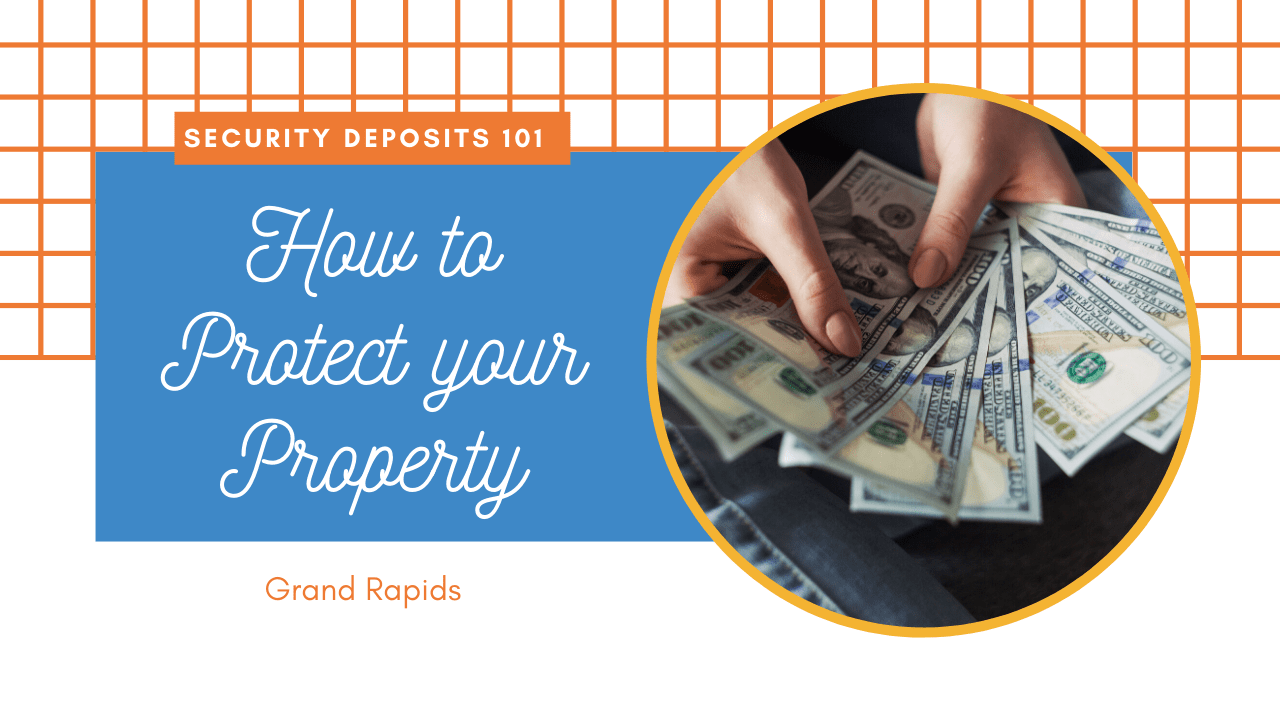
An important thing that landlords need to understand is that a security deposit is a tenant’s money. It does not belong to the property owner. That security deposit can only be used once the tenant has moved out of the residence, and it can only be used for past rent and damages.
Security Deposit Amounts
Landlords are often unsure of how much to charge for a security deposit. The law varies from state to state. In Michigan, the maximum amount a landlord can charge is the equivalent of one and a half month’s rent. So, if you have a property that rents for $1,000, the most you can charge for a security deposit is $1,500. If tenants have clean records and good credit, it’s usually adequate to ask for one month’s rent. There are some triggers that would make a security deposit of a month and a half more appropriate.
Pets and Deposits
When tenants move in with animals, it’s a good idea to collect a deposit that equals a full month and a half. Each Grand Rapids property management company handles pet deposits in different ways. Sometimes, tenants will be charged a fee instead of a deposit.
Trust Accounts
 The security deposit money must be kept in a trust account. It cannot be used for a landlord’s spending and it cannot be used to make repairs around the house while the tenant is still living there. That type of activity is illegal. Some tenants will ask if their deposit can be used for the last month’s rent. Your answer should always be no. It’s possible they won’t pay you their last month of rent, and you’ll have to use it, but the answer to a question like that is no. Keep the deposit in a trust account until the end of the lease, at which point you can determine how much of the security deposit you will need to keep so you can pay for unpaid rent and damages.
The security deposit money must be kept in a trust account. It cannot be used for a landlord’s spending and it cannot be used to make repairs around the house while the tenant is still living there. That type of activity is illegal. Some tenants will ask if their deposit can be used for the last month’s rent. Your answer should always be no. It’s possible they won’t pay you their last month of rent, and you’ll have to use it, but the answer to a question like that is no. Keep the deposit in a trust account until the end of the lease, at which point you can determine how much of the security deposit you will need to keep so you can pay for unpaid rent and damages.
If you’re not sure about the laws and regulations involved with security deposits, please contact us at United Properties for more information.
 Sergio joined United Properties in 2020. He is a graduate from Pickens Technical College as a Nurse Assistant and as a Small Animal Care Provider in 2010. In the past nine years, Sergio has had various jobs, all focused around customer service.
Sergio joined United Properties in 2020. He is a graduate from Pickens Technical College as a Nurse Assistant and as a Small Animal Care Provider in 2010. In the past nine years, Sergio has had various jobs, all focused around customer service. Eden joined United Properties in 2016. Eden graduated from Davenport University in 2015 with an Associate’s in Business Administration. She’s the Executive Assistant to the Owner of United Properties, with a focus on procedural documentation. She enjoys playing guitar, reading, and doing outdoor activities. Eden is trilingual and able to communicate in English, Spanish, and American Sign Language.
Eden joined United Properties in 2016. Eden graduated from Davenport University in 2015 with an Associate’s in Business Administration. She’s the Executive Assistant to the Owner of United Properties, with a focus on procedural documentation. She enjoys playing guitar, reading, and doing outdoor activities. Eden is trilingual and able to communicate in English, Spanish, and American Sign Language.  David joined the United Properties team in 2019 as the Director of Client Relations and Business Development. In this capacity, he is responsible for leading all leasing, application underwriting, tenant relations, accounts receivable, process improvement, remote workers, and general office functionality (essentially anything outside of maintenance and service). David comes from a longstanding career at a Fortune 15 company primarily in a sales and customer service leadership role.
David joined the United Properties team in 2019 as the Director of Client Relations and Business Development. In this capacity, he is responsible for leading all leasing, application underwriting, tenant relations, accounts receivable, process improvement, remote workers, and general office functionality (essentially anything outside of maintenance and service). David comes from a longstanding career at a Fortune 15 company primarily in a sales and customer service leadership role.

 Matthew joined the United Properties in early 2020. He is a graduate of Lee University with a bachelor’s in Intercultural Studies and also a master’s in Discipleship and Christian Formation. Matthew serves as a project manager over the Rent Ready process. He has 20 years of construction experience and over 10 years of experience in leadership positions. He oversees a team of technicians and schedules outside vendors getting properties back to the United rent-ready standard so that they can be leased again.
Matthew joined the United Properties in early 2020. He is a graduate of Lee University with a bachelor’s in Intercultural Studies and also a master’s in Discipleship and Christian Formation. Matthew serves as a project manager over the Rent Ready process. He has 20 years of construction experience and over 10 years of experience in leadership positions. He oversees a team of technicians and schedules outside vendors getting properties back to the United rent-ready standard so that they can be leased again.

 Cristina joined United Properties as the Accounting and Billing Team Lead in October of 2020. She has experience as a technology professional, an English-Spanish translator, and has worked the past several years as the treasurer of her condominium.
Cristina joined United Properties as the Accounting and Billing Team Lead in October of 2020. She has experience as a technology professional, an English-Spanish translator, and has worked the past several years as the treasurer of her condominium. Rick joined United Properties in 2020 as a Service Coordinator and then later transitioned to the Collections team, where his customer service shines. Rick has an extensive background in customer service and enjoys being able to resolve issues. He and his wife are raising their two kids and in his free time, Rick enjoys making his own homemade jerky.
Rick joined United Properties in 2020 as a Service Coordinator and then later transitioned to the Collections team, where his customer service shines. Rick has an extensive background in customer service and enjoys being able to resolve issues. He and his wife are raising their two kids and in his free time, Rick enjoys making his own homemade jerky. Harriet joined United Properties as a Accounting & Billing Specialist in February of 2021. She has experience as a bookkeeper and a Property Manager for a Real Estate account. She was a working student during her college days. Harriet loves cleaning because she thinks it is therapeutic. She also loves watching series during her free time, and she’s a fur mom of one dog. Her inspiration to work every day is her family.
Harriet joined United Properties as a Accounting & Billing Specialist in February of 2021. She has experience as a bookkeeper and a Property Manager for a Real Estate account. She was a working student during her college days. Harriet loves cleaning because she thinks it is therapeutic. She also loves watching series during her free time, and she’s a fur mom of one dog. Her inspiration to work every day is her family. Diego has an extensive background in customer service and, most recently in Maintenance and
Diego has an extensive background in customer service and, most recently in Maintenance and Paulina joined United in early 2021 as a Leasing Assistant. She has a background studying social work, with several years of experience in customer service. She speaks English and Spanish fluently and loves to learn. Paulina enjoys small road trips and cold, rainy weather. Her dog is her favorite thing in the world.
Paulina joined United in early 2021 as a Leasing Assistant. She has a background studying social work, with several years of experience in customer service. She speaks English and Spanish fluently and loves to learn. Paulina enjoys small road trips and cold, rainy weather. Her dog is her favorite thing in the world.
 Jessica has a Bachelor’s Degree in Financial strategies and public accounting and is studying a masters in Blockchain and Fintech regulation. She has previous experience as a customer service representative. She speaks English and Spanish. She loves taking long walks with her three dogs, hiking and road tripping during the weekends.
Jessica has a Bachelor’s Degree in Financial strategies and public accounting and is studying a masters in Blockchain and Fintech regulation. She has previous experience as a customer service representative. She speaks English and Spanish. She loves taking long walks with her three dogs, hiking and road tripping during the weekends.
 Chris Good is new to the United Properties Team since June 2022 as a Business Development Manager. With years of experience in both the construction industry (Master Electrician) and the Real Estate industry (Broker), he will closely work with new and experienced investors to facilitate their real estate goals.
Chris Good is new to the United Properties Team since June 2022 as a Business Development Manager. With years of experience in both the construction industry (Master Electrician) and the Real Estate industry (Broker), he will closely work with new and experienced investors to facilitate their real estate goals.


 Melba Alvarez
Melba Alvarez Enrique Vergara (Henry)
Enrique Vergara (Henry) Alyssa Conklin
Alyssa Conklin



 Leo Lacson
Leo Lacson
 Dhyana Aragon
Dhyana Aragon Joksan Gomez
Joksan Gomez

 Soroya has been with United Properties since March 2025. Her problem-solving, time management, and communication skills help her shine when working collaboratively with tenants and prospects. She is currently pursuing a degree in Cyber Security at Davenport University. Thanks to her tech-savviness, she excels at navigating and troubleshooting common technology and software issues.
Soroya has been with United Properties since March 2025. Her problem-solving, time management, and communication skills help her shine when working collaboratively with tenants and prospects. She is currently pursuing a degree in Cyber Security at Davenport University. Thanks to her tech-savviness, she excels at navigating and troubleshooting common technology and software issues.